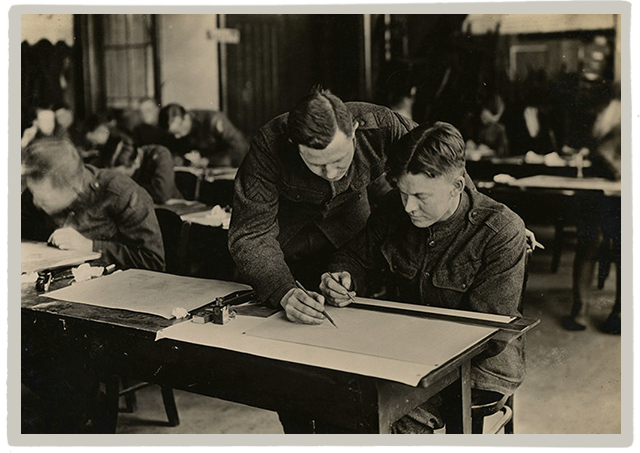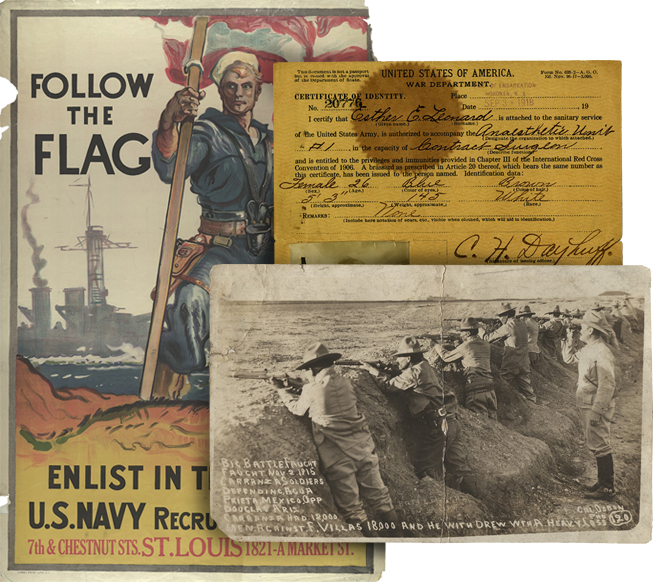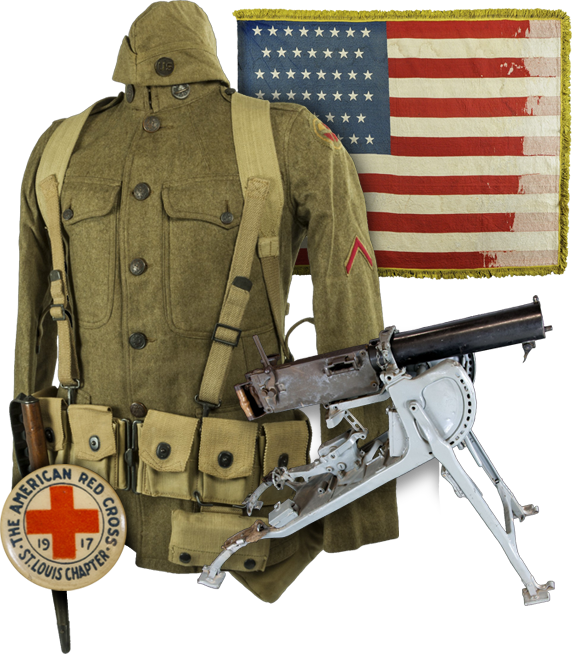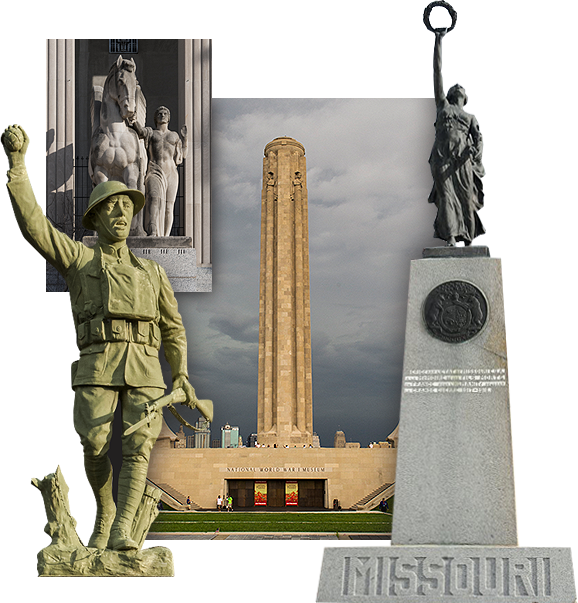Heinrich Altekoester letter to Bernard Rustemeyer - April 17, 1921

Transcript
Duisburg-Ruhrort April 17, 1921 Dear Bernard! Finally, you will certainly rest easy, now that you are getting a sign of life from me. Yes, dear Bernard, I have not forgotten you, but have thought of you all the time, and always wanted to write to you. But I have been, by every tricking the book, been engaged not only with the military but also as a civil servant, so that I continually have a workload as bailiff of three months. On Easter I was in Koerbecke for the first time in 8 years. I took advantage of this opportunity to greet August Stockebrand for you. He gave me your letter of 1915 to read, in which I read that you asked him about my address. August explained to me that you still are asking about this in letters written later. And so it occurred to me, dear Bernard, that loyalty is no empty delusion. Although I have worked the whole Sunday with my wife in the burr, I am pressed, now at 10 p.m., to at least begin a letter to my old construction comrade Bernard, which I will finish tomorrow morning. I took the opportunity to give your last letter to our old teacher, as I was asking for the hand of his daughter. No doubt you know that I am now the son-in-law of our old teacher Knaden. You would certainly recall my wife as the little Mia. She came into the school just as we were graduating. We have been married since 1901. We have six children, of which 4 are still alive. There is Mia, 18, Thea, 15, Paul, 10, and Hendrik, as the Dutch call him, 7 years old. From 1900-1903 I was transferred to Sabikotten for seven months, until on February 1, 1904, when my transfer to Ruhrort followed. Here I found a fertile field of work. The father-in-law has lived with us for the last ten years, until he died with us here in Ruhrort on August 31, 1913 and was buried in Koerbecke. He was a good, honorable, and contented character. I did not let him want for anything. It was good that the fright of the war and famine were spared him. The war has brought me neediness and misery. Germany, which earlier swam in gold, is as poor as Job today. All of Europe has been impoverished by the war. I have gone through frightful times. We were cut off from the entire world by the blockade. The available necessities of life hardly went half way to satisfy the needs. The ones who lived on the land always had something to survive on, while on the other hand the large cities and the industrial sector had to bear the brunt of the famine. Now I sit here in the middle of the kohlennevier. I have received absolutely nothing from my brothers in Koerbecke. They have not recognized me as their brother in my time of need. They gave necessities of life to foreigners instead of the their brother, although I would gladly have paid them the same price. However, their behavior could be attributed to the circumstance that they were embarrassed to demand the going price from me. What's more, our uncle Humpes in Berlingsen bequeathed 25000 Mk to my father so that each of us received 5000 Mk. Both brothers in Koerbecke were ticked off that they weren't the sole recipients of the money, and we do without it. Anton even demanded the whole thing, even though he received the parental estate all to himself. We got 100 Mark. I did not receive any food, so that I would not be deprived of my portion. I have heard that Anton even answered with the following words: "It's good that the dandies have to hurt a little so that their necks become long." I'm thinking that I ought to free myself of this. When I was in Koerbecke I didn't really want to look them up, but I did go. They wanted to dish up, but I said "thank you, no.". Today Anton has 55 morgen of land, and 3 horses. During my three-day stay in Koerbecke I stayed with my in-law, the teacher Brune. He has my wife's youngest sister and is my son-in-laws successor in office. I slept in our classroom - the old school has been completely remodeled as a residence. A new school now stands in the large school playground between Herbst and Kuester. Two male teachers and two female ones are employed there now. The Koerbecke farmers are all very fat, both physically and financially. My brother Franz, the little fellow, weighs at least 250 pounds. His thighs are thicker than his head. There is no more poverty in Koerbecke. The farmers here got good money for their wheat as the dam was built, and then came the war. Koerbecke is prosperous like you cannot imagine. A morgen of land costs 10,000 Mk, and they would pay 12,000 if only they could get some. The farmers don't know what to do with their money. From Wamel to Guenne there is now a huge lake. The beautiful valley has disappeared. As a consequence, the picture of Koerbecke has changed dramatically. The last houses in Koerbecke are Kasper Muellers and the cobbler, Briske. The new Moenen street now runs below Hahnen's and Weller's house. The office is now in the vicariate. The new post office replaced Muechenhof's house in Stern's garden. A police station and jail stand on the Gansebruche, where schuetten's house used to be. Police Chief Luther lives there. A lot of other things in Koerbecke have changed. George Kluesner, who married Anna Bunsen, has died. Josef Bunsen married Anna Kramers. The ansteicher Becker lived at the old hospital; both of them are dead. Anton Afester (Baer) is still living. Adam Obre has died. Likewise his brother Anton, the old Fricke, his son Rudolf and his son Josef are dead. The schornsteinfeger Herbst died in the insane asylum at Haslag (Stadtberge). The Kuester's name is Nentens, the son-in-law of the Neheim widow Stephanblome. Franz Stockebrand is said to be living with his daughter in Neheim. Peter Bratten' house has fallen in, and the Schaeferhoffs, earlier Schulte-Echtrop, built a new house on the site. Both of the Schaeferhofs (?) are dead. Peter Bratten lives in Hanminker's house. Ferdinand Kneers drank himself to death. His wife was Franziska Olre, who is a midwife. Bernard Koellers is dead, the same for Guemie Paulen. Albert Tigges, who married one of Muehlenschulten's daughters, is dead. The old Figges is still alive. Demens Brunen died of Typhus. Heinrich Feldmanns married Berta Stern, after she turned Catholic from Judaism. The Jews are all gone from Koerbecke to Hegahoff Meier who now lives in Stern's house. The old Speckenheuer boys are dead. Lips had at that time used Man's house and wrecked it. Jacob Lips drowned in the Moehne The other lips children all pulled out. Our Franz married Klara Drees and bought Wiegellmann's house. Klara is dad. My mother and my mother-in-law died in 1898 and my father in1905. Franz Rung fell in the war. Anton Fung married one of Ball's daughters. The Bernard that was in Bilan Moved onto the Koeffer place. He died about three years ago. Theodor Westamann now lives in the Bandfrenten house. A Dregger (Whiskey from Bueke), who married Berta Wier, now lives in your house. He had previously angeraucht her, otherwise he probably would not have gotten her. Joseph Dree has Tnie Wier for a wife. Bina Wieer got Wilhelm Nachrichber (Ebel). Wilhelm, too, has passed on. Gertrude Wieer is said to be a housekeeper for her brother Hermann. Ferdinand Wieer's wife drowned in the dam. Herman Stefanschaefer (Teisert) got married only at the age of 50. His parents are dead. The old lady Soerres (Spark.) is said to still be alive. They got new chimes in Koerbecke again. The old ones had to be given up for the war. The other conditions in Koerbecke have become totally storage to me. My stay there was also too short to acquaint myself again. In Speil's meadow there stands a dairy. You probably still remember the new hospital. It was built on Fark's property, who donated his whole proper for this project, which he later regretted. Because later he said, "When the entire populace advises, the soldiers fry, and where the clergy make the decisions, there it is good, or will become good." Eberhard Brisken died 25 years ago. His wife was Maria Schreiber. The neighbor Schomoelschen is also deceased. In this connection you will remember an old matter. As youngsters we were once in the Jewish synagogue, where I wrote "Jews are schlemiels." The Jews complained to the father-in-law," according to the investigation those pouters denounced me to the father-in-law, and you were very much outraged as I was being punished. You took a brotherly interest in my misfortune and said, "just wait. He'll get his." Afterward we beat him up with kicks to the shin. Yes, dear Bernard, those are the old memories of our golden youth, in which we grew up under the protection of our dear parents, and shared shoulder to shoulder, brotherly fashion, in sorrows as well as joys. I recall these times fondly and with joy. There was a community of living between our families, as good as can be imagined. How are you still? How are your brother and your dear sister, Maria. Remember how we teased Maria and me, that the both of us ought to operate the shoe shop in the old Klueseners's house? The old trapdoor was to be the picture window. Yes, dear Bernard, at this point I'm not going to make a secret of it, that at that time I was a secret admirer of Maria. She was serene, sensible and circumspect character, which is attested by the fact that even as a young girl she knew all about housekeeping. Unfortunately because of world conditions it was not granted me to bind our lives together, i.e. to take her home as mine. Please convey to her my special greeting. Hopefully she is faring well. I was also doing well until the outbreak of the war. Then there began for me and my family a time full of tribulation. As you know, I grew up in different circumstances. Also, the 12-year term of service as a soldier at Strepezen and vicinity did not please me. I never made many demands on life, but the war was too frightful. As we were blockaded, there began in 1915 a food shortage and consequently a colossal inflation, which continually got worse, but especially only after the war, when relief was awaited. Like civil servants we had to hunger through on our peacetime salary, which wasn't even enough any more in time of peace. Only when the war was 3 1/2 years along we began to receive some charity. My second job as bailiff brought in practically nothing, because those who took part in the war could not be prosecuted. And now I also started the stupidity of burying my money while having to pay interest on my mortgage from my salary. As of January 1, 1917 my whole salary went for that, so there I was without a penny to my name and not yet old enough to obtain the minuscule means that would deliver me from misery. Dear Bernard, you can draw for yourself the picture of how discouraging it is for a father when he cannot even give his wife and little children a little piece of bread anymore. I went into my little parlor and cried my eyes out. On top of all this, my nerves were shot from overexertion, already even at the beginning of the war. When I saw myself so abandoned I was tired of living. I would rather have died this morning. I could no longer be glad nor laugh, even though I always was a jovial and joking person. Thoughts of the hereafter and of my wife and children sustained me, or else I would have gladly departed this life. I have always held my head high and said that "whoever waits until the end will receive the crown of eternal life. You can't let your wife and children down." The smallest one, who will be 14 in August and who had to have a lot milk, grew up on jelly and carrots. The children, especial the smallest one, hurt me very deeply. But our Lord God blesses the bread of the poor. He has kept our family healthy until recently when my wife needed medical help because of malnutrition. For that reason I went to Koerbecke to get butter and eggs for her. From our picture you can see how it went with us after we had gotten ourselves something. We are both as white as snow. My brothers did not recognize me as their brother in my need, even though they knew very well that a severe famine was ragin here in coal country, and my brother Joseph who lived on the war and half on Ruhrort. He lives in Wanne as lademeister and is married to a woman from Voellingsen, so that it would have been very possible for him to provide me with some food. This was surely his duty morning and night, since I had cobbled for him for three weeks and made him 4 pairs of shoes. With that it was his duty to sacrifice at least three days for me and provide me with some food. But in Wanne he did a booming business and profiteered with it. Yes, yes, dear Bernard, everything has become egoist in Germany. Everybody subscribes to the well known adage: "Everyone for himself and God for us all." The once rich German heart has turned to steel. In this global struggle the German farmer has played the Judas. He ignores us Earlier, if I had a brave, unspoiled young farmer in the troops, he had na advantage over all the others, though I felt like a mother to the company and like they were all my children. Today, as far as I'm concerned, the German farmer is as unsympathetic a man as there is. Across the Rhine, where there are still farms, a farmer charged a woman 30 Mark for 100# of potatoes, while the highest prevailing price was 6 Mark. Now, dear Bernard, I have lost the train of though and must return to the matter of my greatest need. I once again set my heart on something, and borrowed 100 Mark from a fiend of mine in Nemborn, and thus for the insurance of my life bough back my business, where I had lost my shirt. But now I was over the first hurdle. Later the oung collegiates were drawn in again, and thus i obtained more work. Also, we civil servants gradually received replies, so that at least we remained sage from starvation. Many people, especially the youth, were buried because of malnutrition that resulted from the war. America in a commendable way following the Quaker food program, has placed itself at the service of our youth. Both of my knurls have also participated in that.


















Details
| Title | Heinrich Altekoester letter to Bernard Rustemeyer - April 17, 1921 |
| Creator | Altekoester, Heinrich |
| Source | Altekoester, Heinrich. Letter to Bernard Rustemeyer. 17 April 1921. Rustemeyer Family, Papers, 1884-1953. C4017. The State Historical Society of Missouri, Columbia, Missouri. |
| Description | In this April 17, 1921 letter to his friend Bernard Rustemeyer of Osage County, Heinrich Altekoester of Duisburg-Ruhrort, Germany discussed how the war affected his family, Koerbecke, and Germany as a whole. Translation provided by Raymond Backes. |
| Site Accession Number | C4017 |
| Contributing Institution | The State Historical Society of Missouri |
| Copy Request | Transmission or reproduction of items on these pages beyond that allowed by fair use requires the written permission of the State Historical Society of Missouri: 1020 Lowry Street, Columbia, Missouri, 65201-7298. (573) 882-7083. |
| Rights | The text and images contained in this collection are intended for research and educational use only. Duplication of any of these images for commercial use without express written consent is expressly prohibited. |
| Date Original | April 17, 1921 |
| Language | German |



